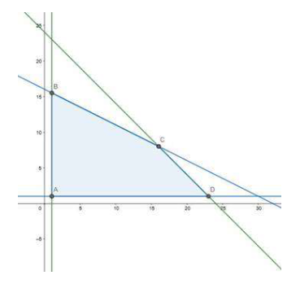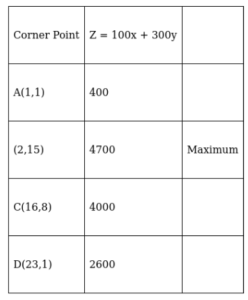Let the firm manufacture ![]() number of necklaces and y number of bracelets a day.
number of necklaces and y number of bracelets a day.
![]() According to the question,
According to the question,
![]()
Maximize ![]()
The feasible region determined by ![]() is given by
is given by

The corner points of the feasible region are ![]() . The number of bracelets should be whole number. Therefore, considering point
. The number of bracelets should be whole number. Therefore, considering point ![]() The value of
The value of ![]() at corner point is
at corner point is

The maximum value of ![]() is 4700 at point
is 4700 at point ![]() .
.
![]() The firm should make 2 necklaces and 15 bracelets.
The firm should make 2 necklaces and 15 bracelets.
